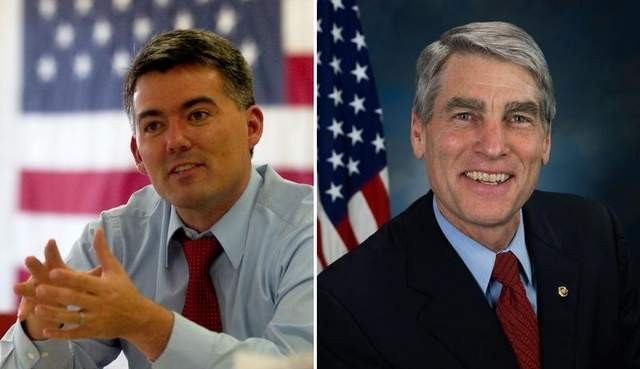

The PPD Colorado Senate race prediction moves to “Leans Democrat” with news of Rep. Cory Gardner (left) challenging vulnerable incumbent Democratic Senator Mark Udall (right).
The dynamic of this race has changed dramatically since the National Journal released a May article entitled, “Colorado’s Forgotten Senate Race.” Now, with the entrance of Rep. Cory Gardner, our Colorado Senate race prediction must be changed from the original rating in our twelfth article offering expanded analysis on our 2014 Senate Map Predictions.
Senator Mark Udall has been extremely vulnerable, but up until now, we couldn’t justify a rating more favorable to the Republicans’ hopes of retaken the Senate simply due to candidate recruitment. In my first article I wrote, “Because Rep. Cory Gardner, who is widely seen as a Republican rising star, decided he was not going to make a run we assume that the political landscape in the Centennial State was just not that GOP-friendly.”
But shortly after The Denver Post first reported Gardner was entering the race, the GOP front-runner and 2010 nominee, Weld County District Attorney Ken Buck, decided he was going to run for Gardner’s seat in the 4th Congressional District. The move by Buck, who had to contend with several second-tier candidates, has propelled Gardner to the front of the pack, paving the way for what I believe will be a relatively easy nomination process.
Former State House Leader and declared primary candidate, Amy Stephens, who spent 7 years in the state legislature, plans to drop out and endorse Cory Gardner. Stephens has ties to the influential Colorado Springs-based social conservative organization, Focus on the Family, and may very well rally whomever in the grassroots wasn’t already inclined to get behind the rising star.
I have long believed Senator Mark Udall could be defeated this cycle under the right conditions, and this is the news we at PeoplesPunditDaily.com needed to view this race as competitive. But before we get in to the actual rating, let’s recap some of the dynamics in the Colorado Senate race.
While Senator Mark Udall has an approval rating that has averaged from a low of 40 percent to a high of 44 percent, Colorado voters say by an average 47.5 – 40 percent margin that the Democratic incumbent does not deserve to be reelected. Adding to the conclusion Senator Udall is soft on support, he earned well under the 50 percent threshold in every major survey even when pitted against lesser-known Republican candidates.
It is too early to tell whether or not the news that Udall’s office intimidated the state’s insurance agency by pressuring them to change the ObamaCare-induced health plan cancellation numbers, will have a lasting effect. Still, it is clear that his support of ObamaCare has hurt the incumbent. As of mid-January, 335,000 Coloradans have lost their health insurance as a result of the law, and Gardner has been an outspoken critic of Udall’s support of the law and his attempt to hide the numbers.
Colorado voters oppose the Affordable Care Act 60 – 37 percent in the latest Quinnipiac University poll, and disapprove 59 – 37 percent of the job President Barack Obama is doing. Similarly, Gallup has measured Obama’s job approval at no more than 42 percent beginning in the fall of 2013, and he is currently at 42 percent now. However, because we only have polling from Quinnipiac University (rated 2 out of 4 for accuracy) and PPP (rated 4 out of 4), both of which use registered voter models and make presuppositions about the electorate far more favorable to Democratic candidates, our Colorado Senate race prediction cannot be largely based upon polling while ignoring Partisan Voting Index trends and the relationship between presidential approval rating and Senate election outcomes.
Both Partisan Voting Index and presidential approval rating models underscore the importance of candidate recruitment. In 2010, Republican candidates won roughly 83 percent of the races in states where the PVI (Partisan Voting Index) was more Republican than D+2. Ken Buck, consequentially, was among the 17 percent of Republican candidates who lost races within those statistical boundaries. Since the PVI was dead even in 2010, and will only tick up to D+1 in 2014, it is statistically likely a formidable candidate such as Cory Gardner could defeat Senator Udall.
Of course, they need a campaign organization and money to fund it to do so.
Gardner has roughly $875,000 cash on hand in his congressional re-election account, which means he will enter the race with far more funding than any other GOP candidate. However, that is far less than Udall’s $4.7 million war chest, and he will need to close that disparity — with inside and outside group money — to remain a contender. There is good news for the Republicans, however, because money that was held back prior will likely begin to start flowing in the race.
We are changing our Colorado Senate race prediction from “Likely Democrat” to “Leans Democrat” until we see more data to gauge the voters’ reactions to their new choice. In closing, I would just add that our new Colorado Senate race prediction reflects the totality of the political environment in the 2014 Senate battle, which is what we foresaw happening all along. As we get closer to the campaigns kicking into high gear, we will see the map expand in favor of the Republican Party. As of now, their greatest challenge is not demographics or other oft-repeated liberal pundit mantras, it is the talent gap.
Rep. Cory Gardner just closed that gap in the Colorado Senate race, substantially.
| Poll | Date | Sample | Udall (D) | Gardner (R) | Spread |
|---|---|---|---|---|---|
| PPD Average | 3/5 – 3/16 | — | 42.0 | 40.5 | Udall +1.5 |
| PPP (D) | 3/13 – 3/16 | 568 RV | 42 | 40 | Udall +2 |
| Rasmussen Reports | 3/5 – 3/6 | 500 LV | 42 | 41 | Udall +1 |






